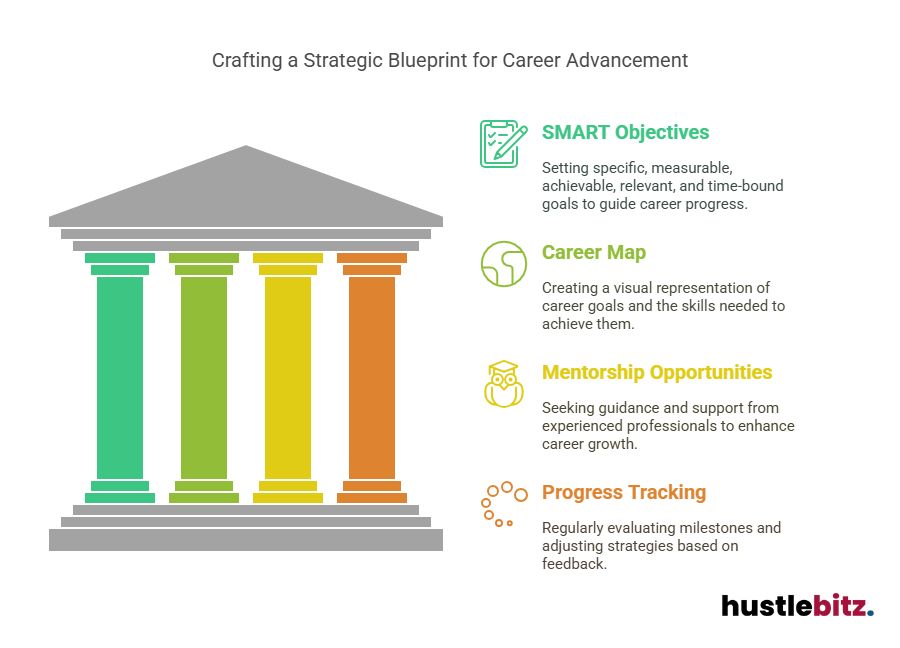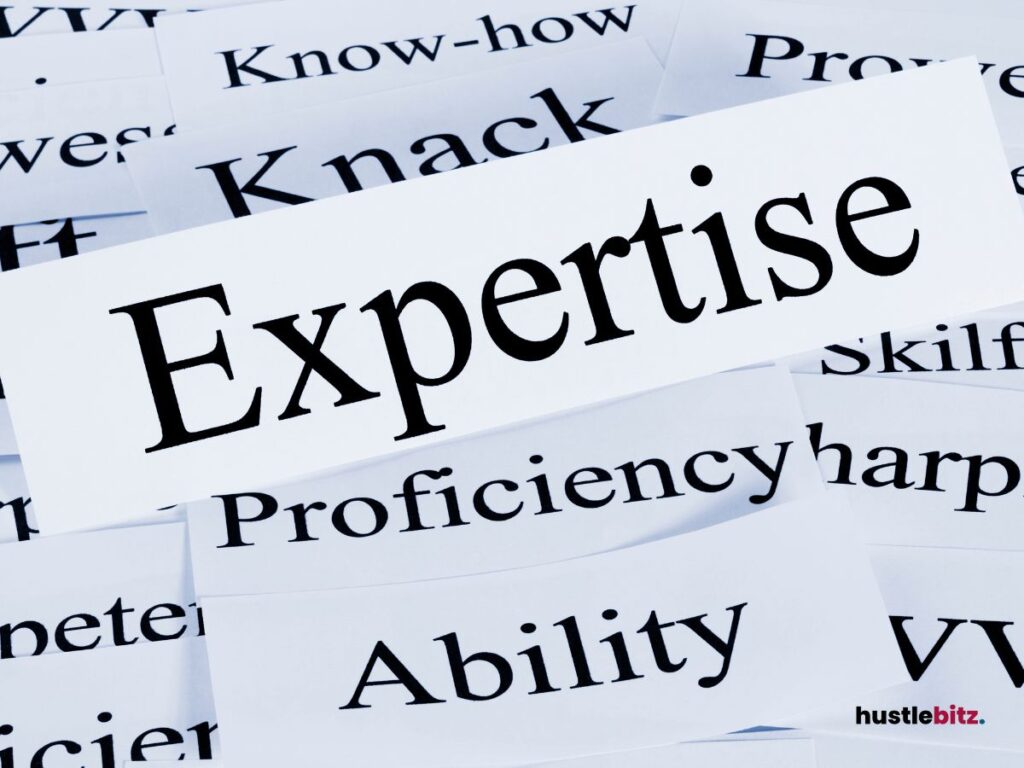Goal setting is essential for professional growth, providing a structured path to career advancement. Utilize SMART objectives—specific, measurable, achievable, relevant, and time-bound—to create clear goals. Establish accountability through partnerships and regular performance evaluations to enhance motivation and track progress. Synergize short-term milestones with long-term aspirations to ensure a coherent career roadmap. Additionally, align your goals with personal values to maintain engagement and satisfaction. Embrace adaptability by reassessing your objectives regularly, fostering resilience in the face of challenges. By implementing these strategies, you can effectively navigate your career development and unlock new opportunities for growth and success.
Key Takeaways
- Set SMART objectives to create clear, actionable goals that align with your career vision and industry trends.
- Establish a career map to visualize your goals and identify necessary skills for advancement.
- Seek mentorship opportunities to gain insights and support from experienced professionals in your field.
- Regularly track progress and adjust strategies through milestone evaluations and feedback mechanisms.
- Align your personal values with your career aspirations to ensure motivation and fulfillment in your professional journey.

Harness Goal Setting Power

Harnessing the power of goal setting is essential for individuals seeking to enhance their professional growth and achieve meaningful career advancements. By employing effective strategies, one can transform aspirations into actionable plans that lead to success. Central to this process is goal visualization, which allows individuals to mentally picture their desired outcomes, fostering a strong commitment to their objectives.
Incorporating accountability partners into the goal-setting framework can significantly amplify motivation techniques, as sharing progress with others provides both support and encouragement. Milestone tracking serves as a critical component, enabling individuals to monitor their journey and adjust their strategies as needed. Utilizing performance metrics allows for an objective assessment of progress, ensuring that one remains aligned with their goals.
Implementing reward systems can also enhance motivation, encouraging individuals to celebrate achievements, no matter how small. Feedback loops play a vital role in personal development, providing insights that inform necessary adjustments to one’s approach. Adaptability strategies are essential, as they prepare individuals to navigate obstacles and embrace changes without losing sight of their objectives.
Cultivating a success mindset is fundamental, as it fosters resilience and a positive outlook, empowering individuals to pursue their goals with vigor. By harnessing these powerful elements of goal setting, professionals can not only achieve their career aspirations but also embark on a continuous journey of growth and self-improvement.
Crafting SMART Career Objectives
To effectively advance in one’s career, crafting SMART objectives—specific, measurable, achievable, relevant, and time-bound—serves as a foundational strategy for setting clear and actionable goals. Establishing a career vision is paramount; it provides a roadmap that guides the creation of these SMART objectives. For instance, a professional aiming for skill enhancement should define specific skills to develop, set measurable milestones, and ensure these goals are achievable within a realistic timeframe.
Incorporating networking strategies is essential when crafting these objectives. By identifying relevant industry trends, professionals can align their goals with market demands, thus enhancing their relevance. Performance metrics should be established to evaluate progress, allowing for necessary adjustments through feedback loops.
Additionally, identifying mentorship opportunities can accelerate growth. A mentor can provide insights and support, helping to refine objectives and navigate challenges. Utilizing time management techniques to allocate dedicated periods for skill acquisition and networking can further ensure that objectives are met efficiently.
Engaging in self-assessment regularly allows individuals to gauge their progress against their SMART objectives, ensuring accountability. Collaborating with accountability partners can enhance motivation and provide external perspectives on areas for improvement.
Architect Your Career Path

Building on the foundation of SMART objectives, architects of their career paths must strategically align their aspirations with actionable steps that navigate the complexities of their professional journeys.
Career mapping is an essential tool in this process, allowing individuals to visualize their goals and the necessary skills for advancement. Skill development becomes paramount, as acquiring relevant competencies is crucial for adapting to shifting industry trends.
Personal branding plays a significant role in how one is perceived within their field; establishing a strong brand can enhance visibility and open doors to new opportunities. Networking strategies are equally important, as building professional relationships can lead to mentorship opportunities that provide guidance and insight into one’s career trajectory.
Regular performance evaluations serve as a checkpoint, enabling professionals to assess their progress and recalibrate their goals as needed. Emphasizing continuous learning is vital in an ever-evolving job market; staying informed and adaptable can significantly increase an individual’s marketability.
Moreover, achieving a work-life balance is essential for sustaining long-term career growth. Professionals who prioritize their well-being are better equipped to foster adaptability skills, which are necessary to navigate unexpected challenges and seize new opportunities.
Synergize Short-Term and Long-Term

Integrating short-term objectives with long-term aspirations creates a cohesive strategy that enhances professional growth and ensures sustained progress in one’s career journey. Establishing clear short-term milestones serves as stepping stones toward achieving a long-term vision. This synergy allows professionals to maintain strategic alignment between daily activities and overarching goals, fostering a sense of purpose and direction.
Effective progress tracking is essential in this process. By regularly assessing short-term achievements against long-term objectives, individuals can identify areas requiring adjustments and adapt their plans accordingly. Adaptability planning ensures that unforeseen challenges are met with resilience, allowing for continued momentum despite obstacles.
Utilizing motivation techniques, such as positive reinforcement and visualization, can enhance commitment to both short-term and long-term goals. Additionally, accountability partnerships—where colleagues or mentors support one another—further solidify the path to success. These partnerships create a sense of responsibility, driving individuals to remain focused on their goals.
Resource allocation is another critical component. Ensuring that the necessary tools and time are dedicated to both immediate tasks and future ambitions optimizes efficiency and effectiveness. Implementing feedback loops, where input is regularly gathered and analyzed, allows for continual improvement and refinement of strategies.
Lastly, setting performance metrics enables individuals to measure their progress quantitatively, ensuring that both short-term achievements and long-term aspirations are pursued with clarity and intention. By synergizing these elements, professionals can navigate their career paths with confidence, ultimately forging a fulfilling trajectory of growth.
Elevate Expertise Through Goals

Setting specific and measurable goals is crucial for professionals seeking to elevate their expertise, as it provides a clear framework for skill development and knowledge acquisition. To achieve effective skill enhancement and knowledge expansion, professionals must identify relevant objectives that align with their career aspirations. Establishing mentorship opportunities can serve as a valuable resource, allowing individuals to gain insights from seasoned experts and navigate industry trends.
Networking strategies also play a significant role in professional growth. Engaging with peers and industry leaders not only broadens one’s perspective but also opens doors to collaborative projects that foster continuous learning. By actively participating in workshops and seminars, professionals can stay updated on the latest developments in their field.
Incorporating feedback mechanisms into the goal-setting process is essential for measuring progress. Utilizing performance metrics and self-assessment techniques can help individuals evaluate their growth while identifying areas for improvement. Additionally, resilience building is vital in the face of setbacks, as it empowers professionals to adapt and thrive.
The table below summarizes key strategies for elevating expertise through goal setting:
| Strategy | Description | Benefits |
| Skill Enhancement | Focus on specific skills to improve | Increased competence |
| Knowledge Expansion | Pursue courses and certifications | Broader knowledge base |
| Mentorship Opportunities | Seek guidance from experienced professionals | Enhanced learning and insight |
| Networking Strategies | Build connections within the industry | Access to collaboration and support |
| Feedback Mechanisms | Regularly seek and incorporate feedback | Continuous improvement |
Align Values with Aspirations
Aligning personal values with professional aspirations is essential for fostering a sense of fulfillment and motivation in one’s career journey. This alignment allows individuals to define their success in a manner that resonates deeply with their personal integrity and career vision.
To achieve this, conducting a thorough value assessment and developing a values inventory is crucial. Understanding what truly matters to you can enhance aspiration alignment and guide your professional path.
Here are four strategies to consider for effective alignment:
- Passion Discovery: Identify what ignites your enthusiasm and integrate those elements into your career goals. Passion often serves as a powerful motivation factor.
- Alignment Strategies: Create a roadmap that connects your values to your aspirations. This may include setting specific, measurable goals that reflect your core beliefs.
- Success Definition: Redefine what success means to you by considering your values. This personalized success definition will help you stay focused on your unique fulfillment journey.
- Continuous Reflection: Regularly reassess your values and aspirations to ensure they remain aligned. This ongoing reflection allows for adjustments and fosters a dynamic career vision.
Navigate Goal Setting Complexities

Navigating the complexities of goal setting requires a strategic approach that balances ambition with realistic planning. Effective goal alignment is essential for ensuring that objectives are not only aspirational but also achievable.
Begin by conducting a priority assessment to identify which goals will have the most significant impact on your professional growth. This assessment helps in challenge identification, allowing you to confront potential obstacles before they become detrimental.
Incorporating accountability partners can enhance your commitment to these goals. These partners provide support and encourage regular progress tracking, which is crucial for maintaining momentum and motivation. Establishing feedback loops enables you to assess your strategies and make necessary adjustments, ensuring that your plan remains relevant and effective.
Implementing motivation techniques, such as celebrating small victories, can significantly bolster your drive. Additionally, prudent resource allocation, including time management, is vital for balancing multiple goals without overwhelming yourself. Prioritizing tasks and allocating time effectively allows for a more structured approach to goal achievement.
Lastly, embrace adaptability strategies to navigate unforeseen challenges. The ability to pivot and revise your goals in response to changing circumstances is critical for long-term success.
Final Thoughts
Mastering professional growth through goal setting is a transformative journey that hinges on clarity, accountability, and adaptability. By setting SMART objectives, you lay a solid foundation for achieving both short-term milestones and long-term aspirations. Aligning these goals with personal values not only enhances motivation but also ensures a fulfilling career path. Regular tracking and feedback mechanisms allow for continuous improvement, while a strong network of mentors and accountability partners can provide crucial support and insight. Embrace these strategies to navigate your career development effectively. With a clear roadmap, effective skill enhancement, and a commitment to aligning your goals with your core values, you can confidently pursue new opportunities and achieve sustained success. Ultimately, goal setting is not just a process but a powerful tool for unlocking your full potential and driving your professional journey forward.




